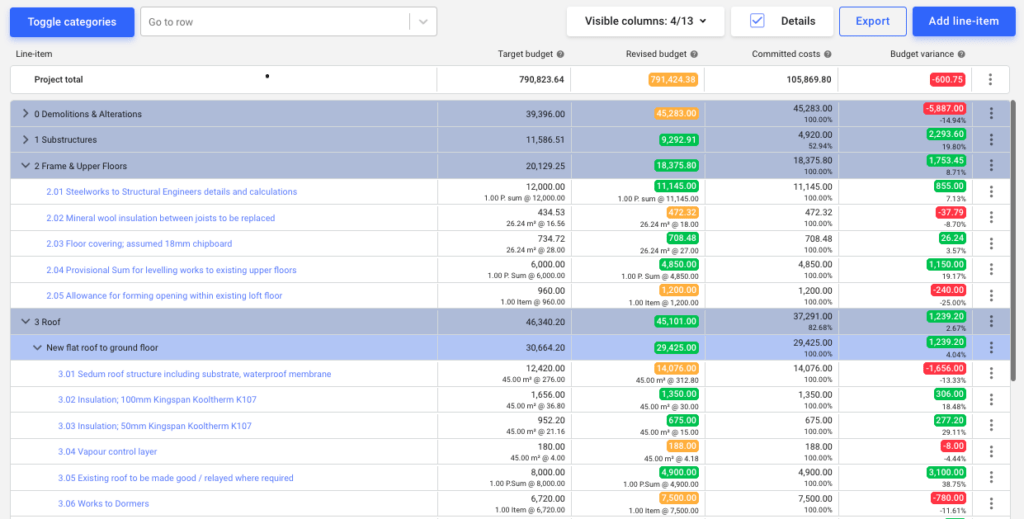Imagine this: a construction project is humming along smoothly. The foundations are laid, the walls are rising, and everything appears on track. But beneath this facade of progress, hidden cracks are forming—cracks that won’t become visible until it’s too late. These cracks aren’t in the concrete; they’re in the budget.
Construction budget tracking is the backbone of a financially successful project. However, poor budget tracking can lead to more than overspending; it can erode trust, compromise safety, and strain the social work environment, causing team stress and frustration.
This article highlights some of the less obvious consequences of inadequate budget tracking, beyond the typical concerns of cost overruns and profitability.
In the following sections, we’ll explore how inadequate budget tracking can affect various aspects of a construction project, from team morale to relationships with stakeholders and suppliers. We’ll also discuss practical strategies to address these challenges, helping your projects stay on track and succeed.
Definition and Importance of Construction Budget Tracking

What is Construction Budget Tracking?
Construction budget tracking involves actively monitoring and managing the financial resources allocated to a project. This process includes tracking actual expenses and committed costs or liabilities—those future financial obligations that impact the project’s overall budget. By comparing these against the budgeted amounts, project managers can quickly identify discrepancies and make necessary adjustments.
Moreover, effective budget tracking ties together key project elements like scheduling, resource allocation, and quality control. Without it, projects can spiral out of control, leading to delays, increased costs, and potential failure.
Why is Budget Tracking Crucial for Construction Projects?
Unsurprisingly, having a proficient budget-tracking process is essential for preventing financial mismanagement and ensuring project profitability.
By consistently monitoring and controlling expenses, project managers can avoid cost overruns jeopardizing the project’s success.
Accurate budget tracking also aligns project costs with initial financial planning, crucial for maintaining stakeholder trust. Clear financial oversight helps to ensure that projects are completed on time, within budget, and to the required quality standards.
In short, effective budget tracking safeguards not just costs but also the project’s overall integrity and success.
Common Issues Leading to Poor Construction Budget Tracking
Inadequate Initial Budget Estimates
Inadequate initial budget estimates can cause major issues for construction projects. When budgets are set with overly optimistic figures or based on incomplete data, projects are far more likely to experience cost overruns.
This often occurs due to underestimating the costs of materials and labor or failing to include sufficient contingencies for unexpected events.
Starting a project with an unrealistic budget immediately creates pressure on resources, increasing the chances of financial difficulties as the work progresses.
Poor Financial Tracking Practices
Inconsistent or Delayed Budget Updates: When project budgets are not regularly updated to reflect actual expenses and committed costs, it becomes nearly impossible to track the project’s financial health accurately.
Delays in updating financial records can lead to outdated information, which can lead to decisions based on incorrect data.
Reliance on Outdated Methods: Tracking project finances using manual or outdated tools, such as spreadsheets, can lead to errors and inefficiencies.
These methods lack the real-time capabilities needed to monitor costs as they occur, making it difficult to respond quickly to financial discrepancies. Integrating the best construction time clock app can enhance budget tracking accuracy by automatically logging labor hours and costs. This provides real-time data that minimizes errors and supports more precise financial oversight.
Failure to Account for Committed Costs: A key aspect of effective budget tracking is accounting for all committed costs—future financial obligations that haven’t yet been paid but will impact the budget.
Not sufficiently tracking all budget commitments can create a false sense of financial security, leading to overspending before these costs are realized.
Inconsistent Communication and Documentation
Inconsistent communication and poor documentation can severely undermine budget tracking in construction projects. When teams fail to communicate regularly, critical budget information can be lost or misunderstood, leading to misalignment and confusion about the project’s financial status.
Without proper documentation, financial records can become disorganized, making it hard to track spending accurately. Incomplete or delayed reports allow budget discrepancies to go unnoticed until they become major issues, increasing the risk of cost overruns.
Clear communication and thorough documentation are essential for keeping the project’s finances on track.
Consequences of Poor Construction Budget Tracking

Poor budget tracking impacts the immediate financial health of a single project, and it can have far-reaching and long-lasting effects on the entire company.
While issues like cost overruns may be tied to a specific project, the repercussions can extend further. For example, the strain on client relationships, increased staff turnover, and compromised safety standards can damage the company’s reputation, lead to legal liabilities, and reduce future profitability.
These consequences can persist long after a project is completed, affecting the company’s ability to secure new business, maintain strong relationships with stakeholders, and innovate effectively in the industry.
Let’s look at some of the more lasting impacts of poor budget tracking.
Decreased Team Morale and Productivity
Financial Uncertainty Causes Stress
Financial uncertainty, often due to poor budget tracking, is widely recognized as a major stressor in the workplace. When the project’s economic status is unclear, team members may worry about potential budget cuts, delays, or job security.
This uncertainty can lower morale and reduce productivity, as concerns about the project’s stability distract workers and diminish their focus and motivation.
Rework and Last-Minute Changes Frustrate Teams
Inadequate budget tracking frequently leads to unexpected financial shortfalls, forcing project managers to make last-minute changes or request rework. These sudden shifts disrupt workflow, frustrate teams, and lead to inefficiencies.
As workers are forced to redo tasks or work under rushed conditions, the quality of work may decline, and the likelihood of mistakes increases. This not only slows down the project but also contributes to a negative work environment, further diminishing morale and productivity.
Strain on Client Relationships
Erosion of Trust

Poor budget tracking can erode client trust. When projects repeatedly exceed budgets or require frequent adjustments, clients may question the management team’s reliability. This decline in trust can lead to strained communication and a weakened client relationship.
Impact on Future Business
Budget issues cause delays and unmet expectations, which can lead to client frustration. This can harm the relationship, making securing repeat business or positive referrals difficult. Maintaining strong client relationships is essential in a competitive market, and poor budget tracking can jeopardize future opportunities and the company’s reputation.
Stifling of Innovation
Limited Resources for Experimentation
Poor budget tracking often results in financial constraints that limit the resources available for experimentation and innovation. When a project struggles to stay within budget, the focus shifts from exploring new ideas and improving processes to simply keeping costs under control.
This environment stifles creativity, as there’s little room for trying new methods, adopting emerging technologies, or investing in innovative solutions that could enhance project outcomes.
Over time, this lack of innovation can cause a company to fall behind competitors who are more agile and willing to invest in new approaches. As McKinsey & Company notes, companies that embrace innovation are better positioned to boost productivity and maintain industry competitiveness.
Focus on Cost-Cutting Over Creativity
When budget tracking is inadequate, the pressure to cut costs becomes a dominant concern. This often leads to decisions prioritizing short-term financial savings over long-term value creation.
For instance, a company might opt to use cheaper materials, reduce labor costs, or forgo investments in technology that could improve efficiency. While these measures might help address immediate budget issues, they can stifle creativity and lead to a less innovative work environment.
Over time, this focus on cost-cutting can hinder the company’s ability to differentiate itself in the market and deliver high-quality, innovative projects.
Compromised Safety Standards
Cutting Corners to Stay Within Budget
When budget tracking is inadequate, financial pressures often lead to cost-cutting measures that can compromise safety standards. Project managers might reduce spending on essential safety protocols, use lower-quality materials, or expedite construction processes to stay within budget.
These shortcuts can significantly increase the risk of accidents and create an unsafe work environment.
While these measures might seem like a quick fix, they can result in much more serious issues down the line, including heightened risks to worker safety and substantial financial and legal repercussions.
Increased Risk of Accidents
Compromised safety standards inevitably increase the likelihood of accidents on the job site. These accidents endanger workers and expose the company to legal liabilities, including lawsuits, fines, and regulatory penalties.
The fallout from a serious accident can also cause project delays, further inflating costs and damaging the company’s reputation. In severe cases, repeated safety violations can damage the company’s standing in the industry, making it harder to secure future projects and partnerships.
How Planyard Can Help Improve Budget Tracking

Dedicated construction budget management software, such as Planyard, can significantly improve financial processes. Below are some examples.
Real-Time Budget Tracking
Planyard tracks the project budget in real-time. Instead of manually inputting data into numerous spreadsheets, Planyard automatically keeps your project budget up to date.
With up-to-the-minute insights, project managers can make informed decisions quickly, keeping the project on track and within budget.
Cost Management
Planyard excels at cost management through its integrated features for purchase orders (POs), subcontract management, and invoice management. As you utilize these features, committed and approved costs are automatically updated in real-time, ensuring that no expenses are overlooked and giving you an accurate, up-to-date financial picture at all times.
By managing actual expenses and future financial obligations, Planyard helps you identify potential budget overruns early. This proactive approach allows you to implement countermeasures well before invoices arrive.
Addressing potential issues early reduces the risk of unexpected shortfalls and eliminates the need for last-minute cost-cutting measures that could compromise project quality and safety.
Centralized Budget Management for Clear Communication
Planyard centralizes budget management in one platform, ensuring all budget-related information is easily available and up-to-date. Integrating project data into a single platform eliminates the delays and confusion often resulting from scattered or incomplete documentation, ensuring everyone can access the latest information in real-time.
With automatic updates to budgets, purchase orders, and financial documents, Planyard enhances transparency and quickly resolves discrepancies. This streamlined approach supports better collaboration and stronger relationships with all project stakeholders.
Saving Time with Streamlined Budget Management
Planyard streamlines budget management, saving valuable time by automating cost tracking and reducing manual tasks. With a clear and accurate financial overview, project managers can spend less time worrying about budget overruns and focus more on innovation and safety.
This efficiency frees up time for your team to concentrate on delivering high-quality, innovative projects that meet the highest safety standards, ultimately enhancing your company’s reputation and long-term success.
Leveraging Data for Better Cost Comparisons
The planyard will store all concluded projects’ information, including final costs of all budget items. This data storage makes it easy to compare costs across different projects. Having all your budget information readily available allows you to use your historical data when creating new estimates for upcoming projects.
Conclusion
Summarizing the Key Points
Poor budget tracking can lead to significant and long-lasting issues such as decreased team morale, strained stakeholder relationships, stifled innovation, and compromised safety standards.
These challenges affect the immediate project and can have a lasting impact on your company’s overall success and reputation.
Reinforcing the Importance of Budget Tracking
Effective budget tracking is a critical component of successful project management. Maintaining accurate and consistent budget oversight ensures your projects stay on track and within financial limits.
This not only helps deliver projects successfully but also preserves client relationships, supports innovation, and maintains safety standards. Over time, these practices contribute to your company’s long-term health and profitability.
Encouraging Action
To avoid the pitfalls of poor budget management, adopting budget management software like Planyard can help streamline your processes and provide real-time insights.
Planyard offers solutions that help you manage budgets effectively, from real-time cost tracking to centralized communication and data management. By integrating Planyard into your project management practices, you can enhance your company’s ability to deliver successful projects consistently, ultimately driving long-term growth and success.
Ready to manage your project budgets? Book a demo with Planyard today to see how our platform can help you achieve better results.
